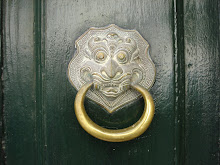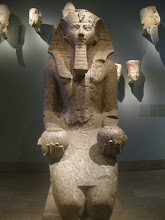We woke up to a cloudy, gray day and got ready to go visit the Old City of Jerusalem.
Going anywhere here requires effort and usually quite a substantial amount of planning.
Originally, we had planned to rent a car and go to Akka and Nazareth in the north of Israel. It was the perfect opportunity: Tarek has a two-week permit to go to Israel (and annexed Palestinian areas), without which we can't cross Qalandia checkpoint between Ramallah and Jerusalem. Our new intern and friend, Moni, has a driver's license--I don't, and Tarek is not allowed to drive in Israel because he has a West Bank ID.
Why we wanted to rent a car instead of taking Tarek's car? Because no one--Palestinian or not--is allowed to drive a car with a Palestinian license plate through Qalandia checkpoint, nor inside Israel.
We thought we had planned everything perfectly.
But then we were reminded that Yom Kippur started today, and everything in Israel closes during the Jewish holidays.
So we decided to postpone the trip to the North until next weekend and go to the Old City in Jerusalem today. The Muslim and Christian neighborhoods don't close during Yom Kippur.
But
then, Tarek's Mom reminded us that Israel imposes closures on the West Bank during Jewish holidays (for "security reasons" I assume). Closures mean that nobody with a green ID--the West Bank ID--is allowed to cross any of the checkpoints into Israel.
Tarek checked his permit, and because it has been issued for work purposes (meetings in Jerusalem), it says that it is valid even during closures.
So we went, Tarek, Moni, Ahmed from the office, and I.
Qalandia checkpoint was empty, even though Fridays are usually among the busiest days because everybody who has a permit (and is let through) goes to Jerusalem to attend the Friday prayers at Al-Aqsa.
We let Tarek try to go through first. Not very surprisingly, they wouldn't let him pass. He tried pointing out that his permit is supposed to be valid even during closures, but the soldiers behind the window didn't really care.
Again, we weren't very surprised.
We went and sat in the car while Tarek called the Israeli authorities to ask why he wasn't let through even though his permit is valid.
The lady answered that it is because of the closure.
Tarek said that his permit says it is valid even during closures.
The lady said that yes, she knows, but he still can't pass.
Tarek asked why. The lady said she couldn't explain in English.
Fabulous.
Outside, the soldier up in the watch tower barked out orders to people in Israeli-licensed cars in broken Arabic.
"Stop there!"
A Watch Tower at Qalandia
We sighed a little, but neither the weather nor any Israeli closure would dampen our mood. We changed our travel plans a third time and turned to go to Al-Khalil in the south of the West Bank instead.
The way to Al-Khalil is long and sometimes a little treacherous as it winds up and down dangerously steep hills. And by "the way to Al-Khalil" I mean the way Palestinians are allowed to take (we're not allowed to take the much shorter road through Jerusalem, but have to drive around the whole city instead).
At one point, the road led us halfway up a hill, only to stop us at a dirt and rock mound that he Israeli military had dumped in the middle as a makeshift roadblock for reasons left unexplained.
We turned back and took a detour around the hill. Driving past Israeli settlements--the roads unusually full of military jeeps because of the Jewish holiday (I suppose)--Tarek motioned to the gray sky and said,
"Look, even God is angry at the Jews today."
Once in Al-Khalil, we visited the Herbawi Factory for Palestinian scarves (but I will write about this factory in another blog post), bought Khalili ceramics at the ceramics factory, and visited the Old City that the Jewish settlers are trying to take over by way of military force and harassment.
The Old City is dismally empty and quiet, like a ghost town. Palestinians can't keep their shops open and streets are closed off for exclusive use by settlers (I've written about this before
here and
here).
A small Palestinian boy ran up to us with a water gun and began to spray in our direction. He stopped nicely to have his picture taken.
Palestinian Boy with Water Gun
A grandmother invited us in for tea at her small shop that she keeps open in spite of it all. She already had two guests--two observers from
TIPH, the international civilian observer mission in Al-Khalil that monitors human rights breaches and reports from the military checkpoints in the city.
Drinking Tea at One of the Very Few Shops that Remain Open
We discussed the situation and drank sweet tea from plastic cups. The grandmother's grand daughter tried on scarves from the store, and a small boy sat and played with a plastic gun and listened to the conversation, half in Arabic, half in English. The low, domed ceiling of the small room was covered with canvas. Nobody walked past on the narrow street outside.
The TIPH observers advised us to hurry and drink up if we wanted to visit the Ibrahimi Mosque before the Israeli military closed off the whole area for the settlers, because we don't want to risk getting caught in a crowd of settlers.
We thanked the grandmother for her hospitality, and walked down the empty streets, through the checkpoint, and to the Ibrahimi Mosque.
A few Palestinian boys followed us.
It's Friday today, and on Fridays only Muslims are allowed inside the Mosque. Tarek waited with non-Muslim me outside while Ahmed and Moni went inside. We sat on chairs that the Palestinian mosque guard put out for us.
The guard stayed with us and talked about the settlers. They would come out after an hour or so, he said, escorted by the military as always, on the eve of their Yom Kippur. Normally they come out to stir up problems on their holidays, but Yom Kippur is their Day of Atonement--the time of the year when they are expected to ask for forgiveness from God. The guard didn't expect them to do anything too bad today.
But he and Tarek were doubtful anyway whether any God could forgive them for what they are doing.
(What is it that they are doing? They set fire to Palestinian houses, break into their homes, harass them on their streets, take over their neighborhoods, throw stones at people and threaten with guns, and then camp on the lawn outside the Ibrahimi Mosque as if everything is perfectly normal).
Israeli Settlers Camp Outside the Ibrahimi Mosque, on the Side They Have Occupied
We walked on down to the Shuhada Street where the Israeli army has closed down (and welded shut the metal doors to) all Palestinian shops, and set up a military checkpoint with soldiers that keep all Muslim Palestinians off the street (Christian Palestinians can still go sometimes).
A small Palestinian boy joined us, or sort of decided that he wanted to escort us there. The soldiers thought Tarek is a foreigner and let him through. Ahmed was not allowed. We took a few steps on Shuhada Street.
I felt uncomfortable.
The boy tried to catch my attention, still standing behind the crush barrier that separates the settlers from the Palestinians, and I walked up to him.
"Tehkeesh arabi," he told me under his breath.
Don't speak Arabic.
He doesn't want me to get into trouble.
Settlers, with their black pants, white shirts, their curls and kippas, walked on one side of the concrete barrier that leaves a narrow strip of the street for Palestinians to be able to access a street a little further down. The Palestinian kids who have followed us for some time leaned on the road blocks and observed.
Separation. Soldiers.
Soldiers, Settlers and Palestinian Boys on Shuhada Street
It was getting late, the settlers would come out soon. We walked back, told the grandmother to close the shop because the settlers would come.
She nodded.
I smiled at her and something broke inside of me. All the humiliation, the anger, the sorrow that I had collected during the day just somehow turned into tears, and I tried to walk faster to get away from it.
The sky was still gray, and if God gets angry then I suppose Tarek was right about today.
Even God is angry at the Israelis.









































